Products You May Like
JOHANNESBURG — Airbus signed a contract with Arianespace on Dec. 7 to launch a four-satellite optical Earth observation constellation aboard a Vega C rocket in 2023.
The four-satellite Composante Optique 3D (CO3D) constellation is a joint undertaking by Airbus and the French space agency CNES. The two partners each invested approximately 100 million euros ($112 million) in the project with the aim of creating a highly detailed 3D map of the Earth’s landmass within two years.
Airbus spokesperson Guilhem Boltz said Vega C was chosen for the CO3D mission because it is ideally suited to deploy multiple small payloads into the target orbit of 500 kilometers.
Each of the four CO3D satellites weighs just 300 kilograms and carries an optical payload capable of imaging the ground in 50 centimeter resolution. The data collected by the constellation will be fed into an Airbus digital processing system that integrates advanced algorithms developed by CNES to quickly produce precise 3D maps.
The launch of the initial four CO3D satellites is expected to be just the first of a larger constellation. Airbus anticipates that the constellation could grow to between 12 and 24 satellites.
The additional CO3D satellites are expected to be purchased by governments, private customers and by Airbus itself, an avenue by which the European aerospace corporation expects the bulk of the constellation will be built. Guilhem said that Airbus already has commitments for additional satellites, although he declined to name customers for follow-on CO3D missions.
CNES and Airbus commit to Vega
Vega C is under development to replace the Vega rocket that debuted in 2012 and flew 14 consecutive successful missions before suffering two failures in three attempts since mid-2019. The most recent failure took place in November and resulted in the destruction of a pair of payloads that included the CNES TARANIS satellite.
Despite the failure, CNES and Airbus have committed to launching aboard the next-generation Vega launch vehicle. According to Arianespace spokesperson Claudia Euzet-Hoyau, the launch contract reaffirms the value of the Vega C vehicle.
“Vega C, the new-generation European light-lift launcher has reaffirmed, once again with this new contract, its ability to meet users’ innovative needs in low orbits, especially with its ability to carry multiple payloads,” Euzet-Hoyau said.The maiden flight of the Vega C launch vehicle had initially been slated for this year. However, the first Vega failure in July 2019 resulted in the delay of several missions. As a result, Vega C manufacturer Avio made the decision to push out the debut of its next-generation launch vehicle to no earlier than mid-2021 in order to catch up on Vega missions delayed by the failure.
